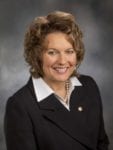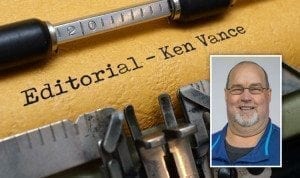 Recent Washington State Legislative session was hard to accept for fiscal conservatives
Recent Washington State Legislative session was hard to accept for fiscal conservatives
For those of us whose ideology leans a little — or a lot — to the right, the recently completed Washington State Legislative session was painful to watch.
Democrats enjoyed a majority in both the House and the Senate, so for the most part, they pretty much were able to pass any legislation they desired. The landslide of their liberal agenda was so prolific that it even led to the stunning decision of Gov. Jay Inslee — a Democrat himself — to veto the bill exempting Washington legislators from public-records law.
Area Republicans and conservatives were shocked that there was legislation so egregiously flawed, including the process that lacked the appropriate transparency and public input, that a very left-leaning governor stood in the way of the passage of legislation from an equally left-leaning majority of lawmakers.
Another sign of how one-sided the session was could be illustrated by the frustration shown by the Republican lawmakers in the minority in the House of Representatives. That frustration reached its peak when they withheld their votes on a bill that would restructure contracting for in-home care providers and potentially require them to become union members. The Republican legislators felt the debate was censored and one-sided. The bill ended up passing 50-0, with 48 (Republican) representatives listed as “excused.’’
I can appreciate that lawmakers aren’t going to agree on issues before them. I’m comfortable with that. I’m also comfortable with the fact that the party in the majority has the ability to accomplish more than the one in the minority. It’s the responsibility of the voters to hold their elected officials accountable. These things can be corrected at election time.
The differences between Republicans and Democrats — conservatives and liberals — makes more sense to me when it comes to social issues. I understand we don’t all have the same beliefs. We have different religious beliefs and we’ve all had different environmental factors that have impacted our lives and that helps shape how we feel about social issues.
What I don’t understand is how we often disagree so dramatically on fiscal issues. So, while there are many reasons for some of us to be disenchanted with the actions of lawmakers during the recent legislative session, at the top of my list is the decisions lawmakers made that affect our money, or our ability to keep as much of it as we can.
Washington’s economy is so robust right now that lawmakers were presented with a windfall of unexpected revenue — in the amount of $1.3 billion for the 2017-2019 biennium. Fiscal conservatives in the Washington State Legislature knew exactly what they wanted to do with that revenue.

“In my opinion, we should have taken that full amount and given it back to the taxpayer to use to reduce their property taxes,’’ said Rep. Vicki Kraft (R — 17th District). “Instead, the legislature chose not to do that. They decided to give back only $320 million in 2019. They’re not even going to give it back until 2019. For me, that was the biggest missed opportunity during this session.’’
Hard not to agree, in my opinion, with Kraft, who signed on to Rep. Brandon Vick’s (R — 18th District) bill that would have used the windfall to give property tax relief to citizens THIS YEAR, rather than in 2019.
“Nothing shocks me in Olympia anymore,’’ said Rep. Liz PIke (R — 18th District), who earlier this year announced her intent to leave politics at the end of her current term. “We were looking at $1.3 billion in unanticipated revenue from new economic growth. That is new taxes coming into the state because the economy in many parts of the state is booming. There was absolutely no excuse to raise taxes.’’
Pike, an outspoken Conservative throughout her political career, is obviously in favor of returning income to citizens.

“The bad thing is we spent some of that new revenue,’’ Pike said. “I just think as a matter of fiscal policy we should be putting more in a rainy day fund or returning it to the people. We shouldn’t be taking money out of the rainy day fund during high economic times. That’s what the Democrats did.’’
Pike’s reference to the rainy day fund is actually the Budget Stabilization Account, but she prefers to refer to it as the “rainy day fund.’’
“In true Democrat style, when we get more money, let’s just spend it, which is terrible,’’ Pike said of the actions of the liberal lawmakers in the state legislature.
The good news for fiscal conservatives in Washington is that lawmakers were able to prevent a carbon tax bill and a capital gains tax, for now at least.
The attempt to place a tax on fossil-fuel use was Gov. Inslee’s plan. It would have made Washington the first U.S. state to impose a direct tax on carbon-dioxide emissions from fossil fuels.
“The capital gains tax would have been a 7 percent tax,’’ Kraft said. “If that would have passed, I can almost guarantee that would become a state income tax at some point in the future. We need to be clear about what that is and make sure we are fighting against that at every step of the way.’’




 Recent Washington State Legislative session was hard to accept for fiscal conservatives
Recent Washington State Legislative session was hard to accept for fiscal conservatives